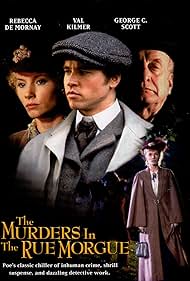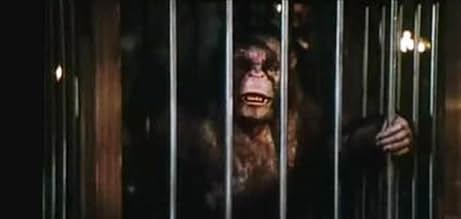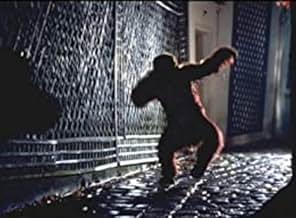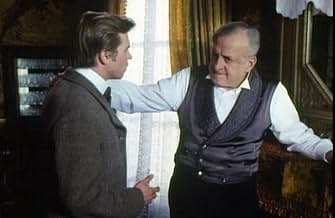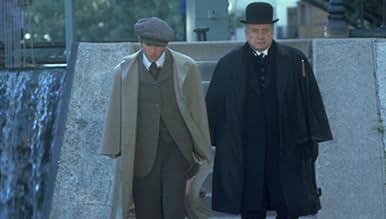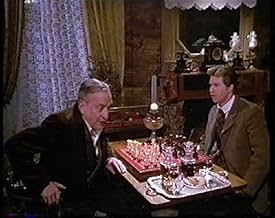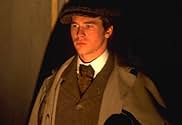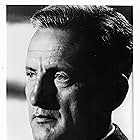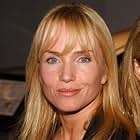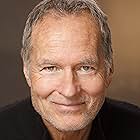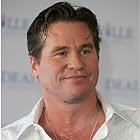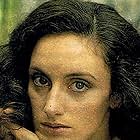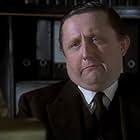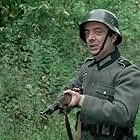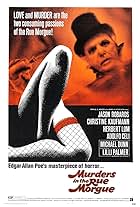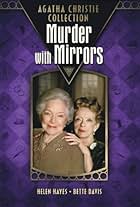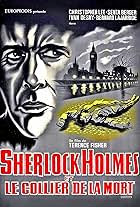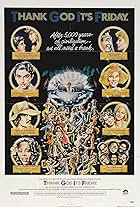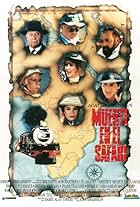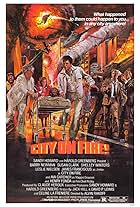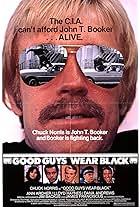A detective comes out of retirement to help his daughter's fiance prove that he did not commit a series of murders.A detective comes out of retirement to help his daughter's fiance prove that he did not commit a series of murders.A detective comes out of retirement to help his daughter's fiance prove that he did not commit a series of murders.
- Witness
- (uncredited)
- Henri
- (uncredited)
- Director
- Writers
- All cast & crew
- Production, box office & more at IMDbPro
Storyline
Did you know
- TriviaThe Murders in the Rue Morgue (1986) was shot in Paris. Location shooting included at Notre Dame Cathedral, the Place de l'Opéra and in Buttes-Chaumont, a park that stands in for the Bois de Boulogne of 1899. About 30% of the film was shot away from the city, such as the prison sequences which were shot in Corbeil, Marne.
- GoofsThe old woman's body must have been thrown from the windows at the front of the house rather than those at the back, as it lands on a grassy patch of some sort rather than in the back alley. However, the newspapers report that a crowd of people had already gathered at the front of the house, drawn by the screams of the two women, and yet none of them saw the window being opened and the body hurled out. Furthermore, the police discount the possibility of any of the windows being opened because they were nailed shut.
- Quotes
Auguste Dupin: [awakened while playing chess] Oh, dear!
[clears his throat and looks at the board]
Auguste Dupin: Did I miss that? Am I losing my concentration as well as everything else?
[laughs]
Claire Dupin: You were asleep, Father?
Auguste Dupin: That's no excuse for incompetence. I used to be able to sleep and think at the same time.
[laughs ironically and then adds introspectively]
Auguste Dupin: I was famous for it.
- ConnectionsVersion of The Murders in the Rue Morgue (1914)
Several factors contribute to this. First, David Epstein's screenplay effectively rips all the subtlety out of the source material. Second, director Jeannot Szwarc makes absolutely no attempt to film this in a way that takes advantage of its low budget and venue. Finally, the casting is utterly random. Accents and nationalities are thrown together with total abandon.
In spite of all that, some the cast members manage to put in good performances. George C. Scott (as Auguste Dupin) is really excellent, with great command of his dialogue. Naturally, he is miscast, but acts as if he is in a far better film. A very young Val Kilmer (as Phillipe) is good, but has almost nothing to work with. He too, is miscast, though the main reason I originally watched this. Ian McShane is certainly entertaining, but his character has no subtlety.
After the acting, there's little to say. The only quality the film has left it owes to its source material. This might have been acceptable for an original script, but as a badly adapted story, it is simply disappointing.
The editing seems haphazard at points, either that important scenes were removed, or never filmed. Dupin's realization of the culprit is never explained, nor the contents of his newspaper ad, or any of his deductive process for that matter. Phillipe's process of discovering Adolphe's unfaithfulness is also never explained.
Finally, the intelligence of the script dips considerably by the final scenes. I won't elaborate, but they have all the brains of a 1950s horror B movie. Really weak.
RATING: 6.2 out of 10
- SteveSkafte
- Sep 24, 2008
- Permalink
Details
Contribute to this page

